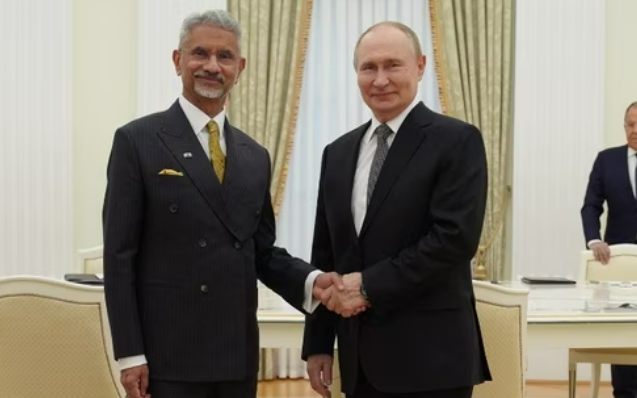India’s foreign minister S. Jaishankar met Russian President Vladimir Putin in Moscow on Thursday, underscoring New Delhi’s emphasis on sustaining its strategic and economic partnership with Russia. The visit comes at a sensitive time, as the United States has imposed unprecedented tariffs on Indian exports, citing India’s continued purchase of discounted Russian oil despite the Ukraine war.
India Stresses Long-Standing Russia Ties
During the meeting, Jaishankar conveyed Prime Minister Narendra Modi’s commitment to deepening bilateral cooperation with Russia, particularly in energy, defense, and trade. The Indian minister noted that the India-Russia relationship has withstood international turbulence and remains a cornerstone of New Delhi’s foreign policy.
Putin, welcoming Jaishankar, acknowledged India’s balanced global stance and its consistent call for peace in Ukraine. Both sides reaffirmed that energy security and trade expansion will remain at the center of their engagement.
Talks With Lavrov and Sharp Response to US
Earlier in the day, Jaishankar held detailed discussions with Russian foreign minister Sergey Lavrov. At the joint press briefing, the Indian minister was asked about the US tariffs that Washington claims are a response to India’s alleged “profiteering” from Russian crude purchases.
Jaishankar pushed back firmly, questioning the logic of Washington’s argument. “We are a country where the Americans themselves have said for years that we should do everything possible to stabilize the global energy market, including buying oil from Russia. Incidentally, we also buy oil from the US, and that amount has increased,” he said. “So, honestly, we are very perplexed at the reasoning behind this penalty.”
Trump Tariffs Target India
The tariff issue has become one of the most contentious points in India-US relations this year. US President Donald Trump has rolled out the steepest tariff hikes ever against India, imposing a 25% duty on Indian exports, with another 25% set to take effect later this month as a “penalty” for India’s post-war oil imports from Russia.
Washington has argued that unlike China, India sharply increased Russian crude imports after the Ukraine war began and has been reselling refined products at a profit. The US treasury secretary recently justified the softer approach toward Beijing by noting that China’s oil purchases from Russia were “pre-existing” and not expanded in the same way as India’s.
Balancing China and Russia Amid US Pressure
Jaishankar’s Moscow visit came just days after he hosted Chinese foreign minister Wang Yi in New Delhi, signaling India’s effort to simultaneously stabilize ties with both Russia and China at a time of tariff-related strain with the US. The Modi government has carefully presented this balancing act as a pragmatic response to shifting geopolitical realities.
Prime Minister Modi’s recent remarks about Putin highlight this approach. In a phone conversation following Putin’s summit with Trump, Modi called the Russian leader a “friend” and reiterated India’s support for a peaceful resolution of the Ukraine conflict. Both leaders agreed to remain in close contact and deepen economic cooperation.
India’s Recalibration in a Multipolar World
The developments point to a broader recalibration of India’s foreign policy. While Delhi has worked closely with Washington on defense, technology, and regional security in recent years, the Trump administration’s inward-looking trade posture has forced India to reassess.
By renewing momentum in its partnerships with Moscow and Beijing, India is seeking to secure its economic interests, especially energy supplies, while maintaining strategic autonomy. Analysts say this tilt is not an abandonment of the US, but a reminder that New Delhi will not accept being pressured into one-sided alignments.
Outlook
With the second round of tariffs set to hit Indian exports soon, the Modi government appears intent on demonstrating resilience by leaning more firmly on its Russia ties. At the same time, it is cultivating dialogue with China, ensuring India is not isolated in the rapidly shifting global order.
As Jaishankar’s visit to Moscow shows, India is determined to pursue a pragmatic course—balancing old partnerships with new realities, and standing its ground against Washington’s penalties. The coming months will be a test of whether this strategy can shield India’s economy while reinforcing its position as an independent global actor.








